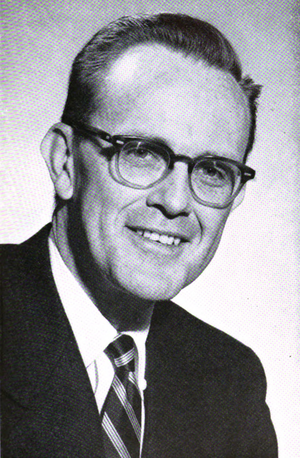Philip Hart
( Lawyer) | ||||||||||
|---|---|---|---|---|---|---|---|---|---|---|
 | ||||||||||
| Born | Philip Aloysius Hart December 10, 1912 Bryn Mawr, Pennsylvania | |||||||||
| Died | December 26, 1976 (Age 64) Washington D.C. | |||||||||
Cause of death | ||||||||||
| Alma mater | • Waldron Academy • Georgetown University • University of Michigan Law School | |||||||||
| Children | 8 | |||||||||
| Spouse | Jane "Janey" Hart | |||||||||
| Member of | Church Committee | |||||||||
| Victim of | ||||||||||
| Party | Democratic | |||||||||
US Senator who was strong supporter of civil rights, anti-trust legislation and consumer and environmental protection. Member of Church Committee. Died of cancer soon after.
| ||||||||||
Philip Aloysius Hart was an American lawyer and politician. A Democrat, he was a United States Senator from Michigan from 1959 until his death from cancer in Washington, D.C. in 1976. He was known as the "Conscience of the Senate".[1]
Contents
Career
Hart worked as a lawyer in Detroit until serving in the United States Army during the Second World War. He was wounded during the D-Day landings in Normandy and left the army in 1946 as a lieutenant colonel.[2]
In 1949 Hart was appointed as Michigan Corporation Securities Commissioner. This was followed by other posts such as State Director of the Office of Price Stabilization (1951-52), District Attorney of the Eastern Michigan District (1952-53), legal adviser to the Governor of Michigan (1953-54) and Lieutenant Governor (1955-58).[2]
A member of the Democratic Party, Hart was elected to the Senate in 1958. Over the next few years he gained the reputation for being a strong supporter of civil rights, anti-trust legislation and consumer and environmental protection.[3]
Church Committee
In 1975, Frank Church became the chairman of the Select Committee to Study Governmental Operations with Respect to Intelligence Activities. This committee investigated alleged abuses of power by the Central Intelligence Agency and the Federal Bureau of Intelligence.[3]
When the Final Report of the Select Committee to Study Governmental Operations was published in April 1976, Hart joined Walter Mondale and Gary Hart to publish an appendix to the report. The three men pointed out that "important portions of the Report had been excised or security grounds". However, they believed that the CIA had "used the classification stamp not for security, but to censor material that would be embarrassing, inconvenient, or likely to provoke an adverse public reaction to CIA activities."[3]
Death
Hart died in office. He had announced his intention not to run for re-election in June 1976 and was diagnosed with cancer a month later.[4] The same year, the Senate voted to name its new Senate office building after him, the Hart Senate Office Building.[5] It would have been the first federal government building named after someone still living. The vote was 99-0, with Hart abstaining. He died of melanoma a few days later, just before his term would have expired, and he would have retired. Donald W. Riegle, Jr., who had just been elected to the seat for the next term, was named to fill Hart's seat for the remaining days of the congressional session.
References
- ↑ https://www.nytimes.com/1976/12/27/archives/senator-philip-a-hart-dies-at-64-was-called-conscience-of-senate.html
- ↑ Jump up to: a b https://bioguide.congress.gov/search/bio/H000291
- ↑ Jump up to: a b c https://spartacus-educational.com/WAThartP.htm
- ↑ http://www.lssu.edu/foundation/scholarships/hart/
- ↑ https://www.congress.gov/bill/94th-congress/senate-resolution/525